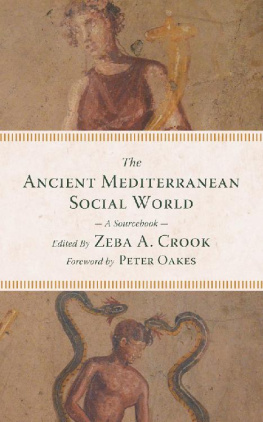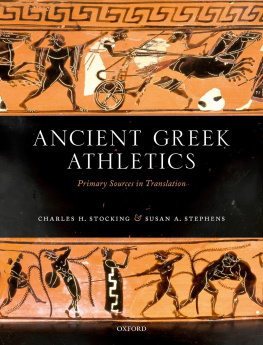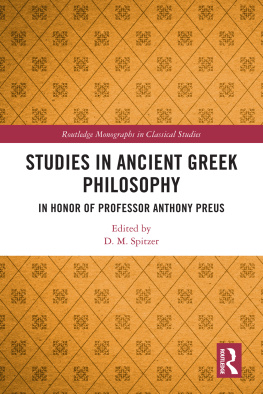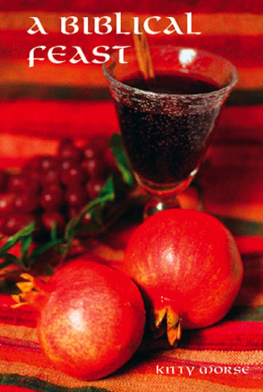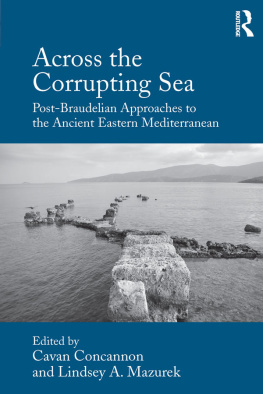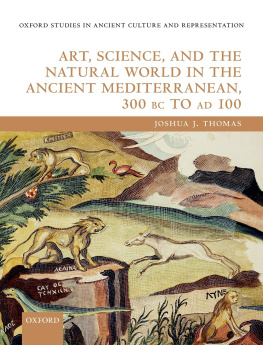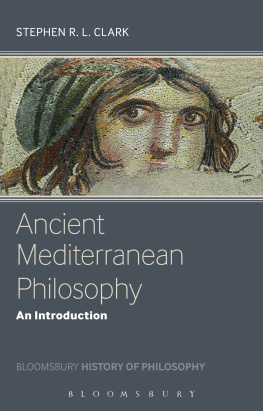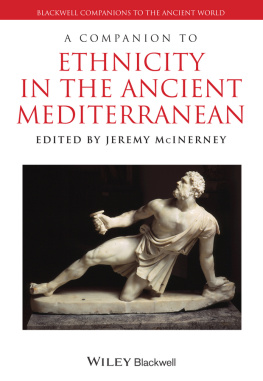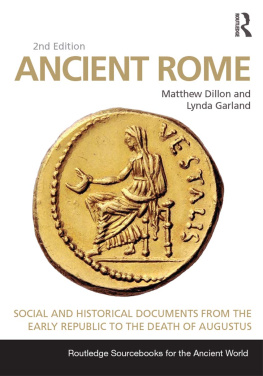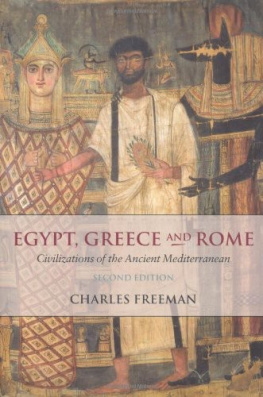This book is a triumphant demonstration of how major social-scientific models used in biblical interpretation have the closest of connections with ancient Mediterranean culture, of how the etic embraces the emic. Across a range of critical issuessuch as economy, kinship, patronage, honor and shame, collectivism, gossip, space, gender, ritual, purity, and the evil eyethe contributors uncover a mother lode of primary evidence from Judean, Greek, and Latin texts, inscriptions, and papyri. It represents a unique and indispensable resource for understanding the ancient social contexts in relation to which we must interpret the biblical texts for their historical meaning.
PHILIP F. ESLER
University of Gloucestershire
If the past is a foreign country, then Crooks sourcebook gives readers the tools to enter and experience that foreign culture. It primes them to articulate both traditional and newer social-scientific frameworks that can help guide their reading and interpretation of ancient texts. Drawing on a diverse range of sources, from Graeco-Roman philosophy and history to the Dead Sea Scrolls, from New Testament and early Christian texts to rabbinic literature, such a resource ensures that we understand as best we can the lived experience of the people represented in ancient texts and that we are not misled by our modern, often anachronistic assumptions, about society and culture.
SARAH E. ROLLENS
Rhodes College
Social-scientific criticism of the New Testament entails the creation of models that are useful for explaining how people in the ancient Mediterranean understood and experienced their social world. This helpful sourcebook provides carefully chosen selections from the varied ancient texts that undergird the models applied in traditional and emergent areas of social-scientific criticism, from patronage and honor to space and secrecy. It is an indispensable resource for students and scholars of the social contexts of the New Testament.
ANTHONY KEDDIE
University of British Columbia
THE ANCIENT MEDITERRANEAN
SOCIAL WORLD
A Sourcebook
Edited by Zeba A. Crook
WILLIAM B. EERDMANS PUBLISHING COMPANY
GRAND RAPIDS, MICHIGAN
Wm. B. Eerdmans Publishing Co.
4035 Park East Court SE, Grand Rapids, Michigan 49546
www.eerdmans.com
2020 Zeba A. Crook
All rights reserved
Published 2020
262524232221201234567
ISBN 978-0-8028-7356-9
eISBN 978-1-4674-5828-3
Library of Congress Cataloging-in-Publication Data
Names: Crook, Zeba A., editor.
Title: The ancient Mediterranean social world : a sourcebook / edited by Zeba A. Crook.
Description: Grand Rapids, Michigan : William B. Eerdmans Publishing Company, 2020. | Includes bibliographical references and index. | Summary: Makes the rich social context of the ancient Mediterranean available to readers through the selection of translated primary sources and by emphasizing the interrelatedness of the topicsProvided by publisher.
Identifiers: LCCN 2019054550 | ISBN 9780802873569 (hardcover)
Subjects: LCSH: Sociology, BiblicalSources. | Mediterranean RegionCivilizationSources. | Mediterranean RegionSocial conditionsSources. | BibleSocial scientific criticism.
Classification: LCC BS670 .A63 2020 | DDC 930/.5dc23
LC record available at https://lccn.loc.gov/2019054550
Translations of the Bible are cited or adapted from the New Revised Standard Version Bible, 1989 National Council of the Churches of Christ in the United States of America. Used by permission. All rights reserved.
Contents
One of the most fortunate points in my doctoral studies came when my submission of a conference paper abstract was redirected from an already-full seminar on Paul to a seminar on the social world of the New Testament, chaired by Philip Esler. He promptly set me to read Thomas Carney, The Shape of the Past: Models and Antiquity, and the work of Bruce Malina, John Pilch, and other members of the Context Group for Biblical Research. I discovered the great potential of triangulation between text, historical evidence, and conscious reflection on social-scientific theory.
In the book before you, scholars, who, between them, have an unparalleled wealth of experience in using various theoretical approaches, share with the reader lists of ancient texts that they have found particularly helpful in applying these theories to biblical studies. Some of the texts indicate the degree of prominence of concepts, such as honor, patronage, or envy, associated with specific theoretical areas. Others give a sense of the shape of that concept in the writers culture. Others indicate links into biblical texts. Lists of Hebrew, Greek, or Latin terms also help the reader investigate relationships between non-biblical and biblical texts in each area.
The overall effect of this book is to give you a sense of what it is about the ancient evidence that has led these scholars into seeing each of the theoretical approaches as a worthwhile way into study of the biblical text. More importantly, it also offers you resources for assessing and pursuing each of those routes into the text.
Experience counts. The sad deaths of Dietmar Neufeld and, more recently, John Pilch and Bruce Malina bring home to me the importance of the transmitting of the fruits of extended experience working in specific areas. Each of the established writers in this book has, of course, published studies elsewhere. However, this book is a particular treasury of what each scholar has found to be key go-to texts in their area. The virtue of transmission is also shown in the volume in another sense, in the appearance of several younger scholars, who have received and are exploring this academic legacy for the coming generation. The resources developed through the concentrated and persistent work of the books contributors are a valuable provision for biblical study, presented in a way readily accessible to every student and scholar. Whatever your approach to the biblical text, you will find that the use of this collection of texts will considerably enrich your study.
PETER OAKES
Manchester
August 31, 2017
| ABD | Anchor Bible Dictionary |
| ANRW | Aufstieg und Niedergang der Rmischen Welt |
| BCH | Bulletin de correspondence hellnique |
| BGU | gyptische Urkunden aus den Kniglichen Museen zu Berlin, Griechische Urkunden |
| BTB | Biblical Theology Bulletin |
| CBQ | Catholic Biblical Quarterly |
| CCCA | Corpus cultus Cybelae Attidisque. Edited by M. J. Vermaseren. Leiden, 197789 |
| CIJ | Corpus Inscriptionum Iudaicarum. Edited by J. B. Frey. Rome, 193662 |
| CIL | Corpus Inscriptionum Latinarum. Berlin, 18631974 |
| CIRB | Corpus Inscriptionum Regni Bosporani. Edited by V. V. Struve. Moscow, 1965 |
| CPJ | Corpus Papyrorum Judaicarum. Edited by V. Tcherikover. Cambridge, 19571964 |
| FC | Fathers of the Church |
| HvTSt | Hervormde teologiese studies |
| IAM | Inscriptions antiques du Maroc. Edited by M. Euzennat and J. Marion. Paris, 19662003 |
| IAsMinLyk | Reisen in Lykien und Karien. Edited by O. Benndor and G. Niemann. Vienna, 1884 |
| IBM | The Collection of Greek Inscriptions in the British Museum. Edited by F. H. Marshall. London, 18741916 |
| ICret | Inscriptiones Cretae Insulae. Edited by M. Guarducci. Rome, 19351950 |
| IDelos | Inscriptions de Dlos. Edited by P. Roussel and M. Launey. Paris, 1937 |
| IDidyma |
Next page
